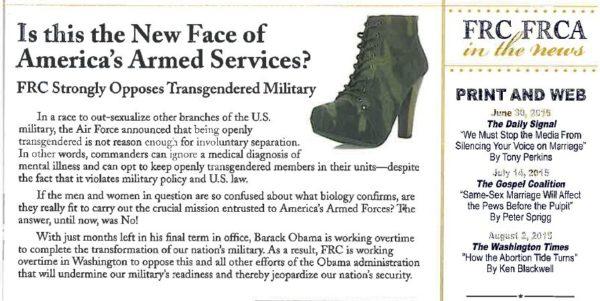
On July 24, 2017, the Family Research Council (FRC), a right-wing political advocacy group based in Washington, DC, issued an Action Alert to its members, enlisting their support in denying healthcare to military personnel who are transgender. FRC argued that providing medically necessary treatment to trans people is “a distraction from the military’s purpose and undermines readiness, recruitment, and retention.” The appeal went on to suggest that trans-affirming care would be a waste of taxpayer money — money that could be better put to use purchasing more fighter jets and missiles.
Two days later, President Trump announced via Twitter that he was reversing a policy that’s been under review since June 2016 which would have allowed transgender individuals to openly serve in the military. Trump argued that the military “cannot be burdened with the tremendous medical costs and disruption that transgender in the military would entail.” Though it’s entirely unclear how Trump’s new decree will be put into effect (a point highlighted by Republican Senator John McCain), according to his tweets, trans people will not be allowed to serve “in any capacity.”
Despite McCain’s observation that “major policy announcements should not be made via Twitter,” Trump’s preferred mode of communication has once again stolen headlines, distracting attention away from the Christian Right engineers of the surge in anti-trans attacks.
In June 2015, FRC laid out a five-point plan for “responding to the transgender movement,” which specifically argues against allowing trans people the right to serve in the military, in addition to withholding gender-affirming healthcare, access to gender transition procedures (often understood to be life-saving for transgender people), legal recognition, and protection from discrimination.This position paper was co-authored by Dale O’Leary, a Catholic writer based in Avon Park, Florida, and Peter Sprigg, a senior fellow at FRC who has advocated for so-called “reparative therapy” and argues that transgender people suffer from “delusions.”
Ignoring trans-affirming positions from the American Medical Association, the American Psychological Association, and the American Psychiatric Society, O’Leary and Sprigg dredged up obscure and outdated scientific theories in an attempt to pathologize transgender people, and then outlined a strategy for advancing anti-trans public policy. As longtime transgender rights activist Brynn Tannehill explains, it’s a plan “to legislate transgender people out of existence by making the legal, medical, and social climate too hostile for anyone to transition [from one gender to another].”

Working in conjunction with Focus on the Family, the Alliance Defending Freedom, and other leading Christian Right organizations, FRC advances its anti-LGBTQ, anti-abortion agenda through reports such as the one authored by O’Leary and Sprigg, as well as lobbying efforts, media work, and high-profile conferences, namely the annual Values Voter Summit. The 2016 Values Voter Summit featured appearances by both Trump and then-Governor Pence. It was the first time a Republican presidential ticket has ever spoken at the summit, and a foreshadowing of the degree of influence FRC would come to command under the new administration.
From the start of this administration, FRC has played a key role in shaping the new political landscape; Trump’s transition team included FRC senior fellow Ken Blackwell as domestic policy chair, and Kay Cole James, a former FRC vice president, was a co-lead on management and budget affairs for the transition team. The organization is now using its close proximity to the president and vice president to further advance its anti-trans agenda.
In a press release following Trump’s Twitter announcement, FRC’s president, Tony Perkins (who blames the high rate of suicide among LGBTQ people on the confusion caused when individuals who “recognize intuitively that their same-sex attractions are abnormal” are offered contradictory messages of affirmation from pro-LGBTQ advocates) applauded the president “for keeping his promise to return to military priorities – and not continue the social experimentation of the Obama era that has crippled our nation’s military.”
Perkins went on to say, “The last thing we should be doing is diverting billions of dollars from mission-critical training to something as controversial as gender reassignment surgery. … As our nation faces serious national security threats, our troops shouldn’t be forced to endure hours of transgender ‘sensitivity’ classes and politically-correct distractions like this one.”
Both Perkins’ and Trump’s language harkens back to one of the oldest tricks in the Right Wing’s playbook: Set up a dichotomy between the “deserving” and the “undeserving,” and drive a wedge between them. As PRA’s late founder Jean Hardisty explained in her 2015 essay, “My On-Again, Off-Again Romance with Liberalism,” the Right has a proven formula for undercutting efforts toward equity: “seize on an example of abuse of a liberal program, market an image of the program’s undeserving recipient (preferably a poor person of color) to the taxpaying public, then sit back and wait for the impact. The ‘welfare queen,’ the Black rapist on furlough, the unqualified affirmative action hire — all have assumed powerful symbolic significance.”
The Right’s new portrait of liberalism run amok is the “delusional” trans person, whose only real delusion is that employees deserve non-discrimination protections and healthcare coverage from their employer. Trump’s description of trans people as being a “burden,” and FRC’s suggestion that trans inclusion is a “distraction” is simply the newest chapter in the Right’s fear-inducing mythology of parasitic, undeserving “takers” in American society. This inhumane framing serves as justification for gatekeeping economic opportunities and civil rights for marginalized people and conceals how destructive so-called austerity can be.
